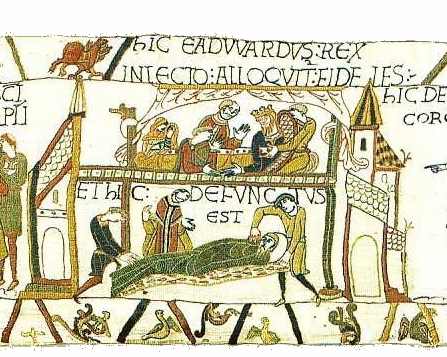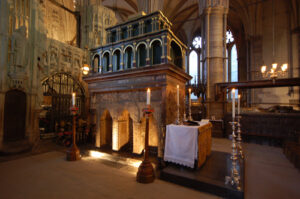
Edith was a common name in Anglo-Saxon England, and it’s hard to keep them all straight. You are more likely to see this name spelled Ealdgyth, Editha, Aldgyth, Eddeva, Aldyth, Eadgyth, Edyth…I’m sure I missed a few. I like to think of her as Edith Godwindottir, but she is rarely found under that name. Why Edith of Wessex? She was Queen of England, not Wessex. She did not belong to the House of Wessex like her husband Edward the Confessor. Since her father was first Earl of Wessex, I suppose that is why the name stuck, though I do find it puzzling.
I also find it ironic that one our primary sources of the period, the Life of King Edward who rests at Westminster was commissioned by Edith herself (admittedly called a work of propaganda), and yet she’s been largely overlooked in favor of her illustrious brother Harold II. Try finding any artwork about her; oh yes, there is one memorable depiction of Edith warming Edward’s feet on his deathbed in the Bayeux Tapestry. If you look really hard you can see a female figure. There’s another depiction of her in a MS illum. next to her husband. But that’s about it. Nonetheless, according to Wikipedia, at the time of her husband’s death she was the wealthiest woman in England and the fourth wealthiest person in England after the King, Archbishop Stigand, and her brother Harold. Of course, by the time William was through with her, I imagine some of that great wealth had dissipated.
As was natural for a noble-born daughter, Edith didn’t have any say in her marriage plans. She was a very important pawn in her father’s ambitions, and I imagine Godwine didn’t even consider that she might object to becoming queen of England. But King Edward was at least 20 years older than her, and it seems to be common knowledge that he wasn’t terribly friendly toward her father. It’s pretty clear that Edward held Godwine responsible for the violent death of his brother Alfred, no matter how much the Earl protested his innocence. I wonder who was more unwilling: the bride or the groom?
So what kind of marriage did Edward and Edith have? It is thought by some that Edith commissioned Edward’s Life as an attempt to save face concerning her barren marriage. After all, a woman was always held responsible for a lack of children, and England’s fate relied on her. If she could portray Edward as too saintly to be anything but celibate, then she was off the hook. Was this really the case? Or did Edward find her guilt-by-association too much to overcome? Did they ever consummate the marriage? Or was one of them merely infertile? Hmm, one of the great mysteries of the eleventh century.
One thing is for sure: once Earl Godwine was sent into exile in 1051, poor Edith was trundled off to a nunnery at the earliest opportunity. It is said that if Archbishop Robert of Jumieges had his way, Edward would have annulled his marriage. But the King stopped short of this; perhaps he feared the consequences. On Godwine’s return, Edith was reinstalled as well, and for the rest of his reign she was treated with respect. On his deathbed, Edward said she had always been like a loving and dutiful daughter. Of course, those could have been her propagandist’s words, but they do put some distance between man and wife.

Edith does seem to have a reputation as a well-educated woman, speaking many languages; she made sure Edward’s appearance was always exquisite, outfitting him with fine accessories and jewels. She is also thought to be demanding and possibly ruthless; there was an assassination at the Christmas Court in 1064 which has been pinned on Edith, who allegedly ordered the murder of a certain Gospatric (or Cospatric) as a favor to Tostig, her closest brother. It must have been difficult for her to be sidelined after Edward died, but in those challenging times maybe it wasn’t such a bad thing to fade into the background. At first Harold treated her as befit her station, then after the conquest William pretty much left her alone, provided she didn’t make any trouble for him. William even buried her in Westminster Abbey beside her husband. In the end it could be said that she fared better than her more illustrious siblings.
Cecily Ortendahl Disana says:
I will be reading this soon I hope !